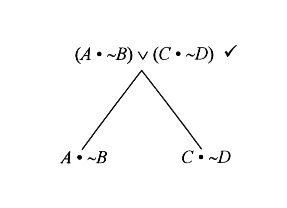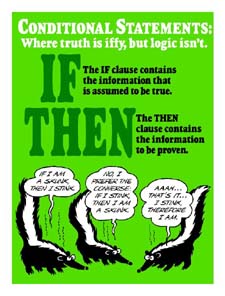Cards In This Set
| Front | Back |
|
Biconditional
|
 Conjunction of two statements (conditional and its converse) |
|
Compound statement
|
 Two or more statements that are joined together |
|
Conclusion
|
 Phrase immediately following the word then |
|
Conditional statement
|
 Statement that can be written in if-then form |
|
Conjecture
|
 Educated guess based on known information |
|
Contrapositive
|
 Negating both the hypothesis and conclusion of the converse statement |
|
Converse
|
 Exchanging the hypothesis and conclusion of the conditional |
|
Counterexample
|
False example
example: apples are red. apples are green. |
|
Deductive reasoning
|
 Uses facts, rules, definitions, or properties to reach logical conclusions |
|
Hypothesis
|
 The phrase immediately following the word if |
|
Inverse
|
 Negating both the hypothesis and conclusion of the conditional |
|
Negation
|
Has the opposite meaning as well as an opposite truth value
~p, read not p |
|
Properties
|
 Ways you can manipulate a statement example: distributive property |
|
Theorem
|
A statement of conjecture that has been shown to be true
example: 2.10- all right angles are congruent |
|
Alternate exterior angles
|
 Opposite outside angles of the bread |



